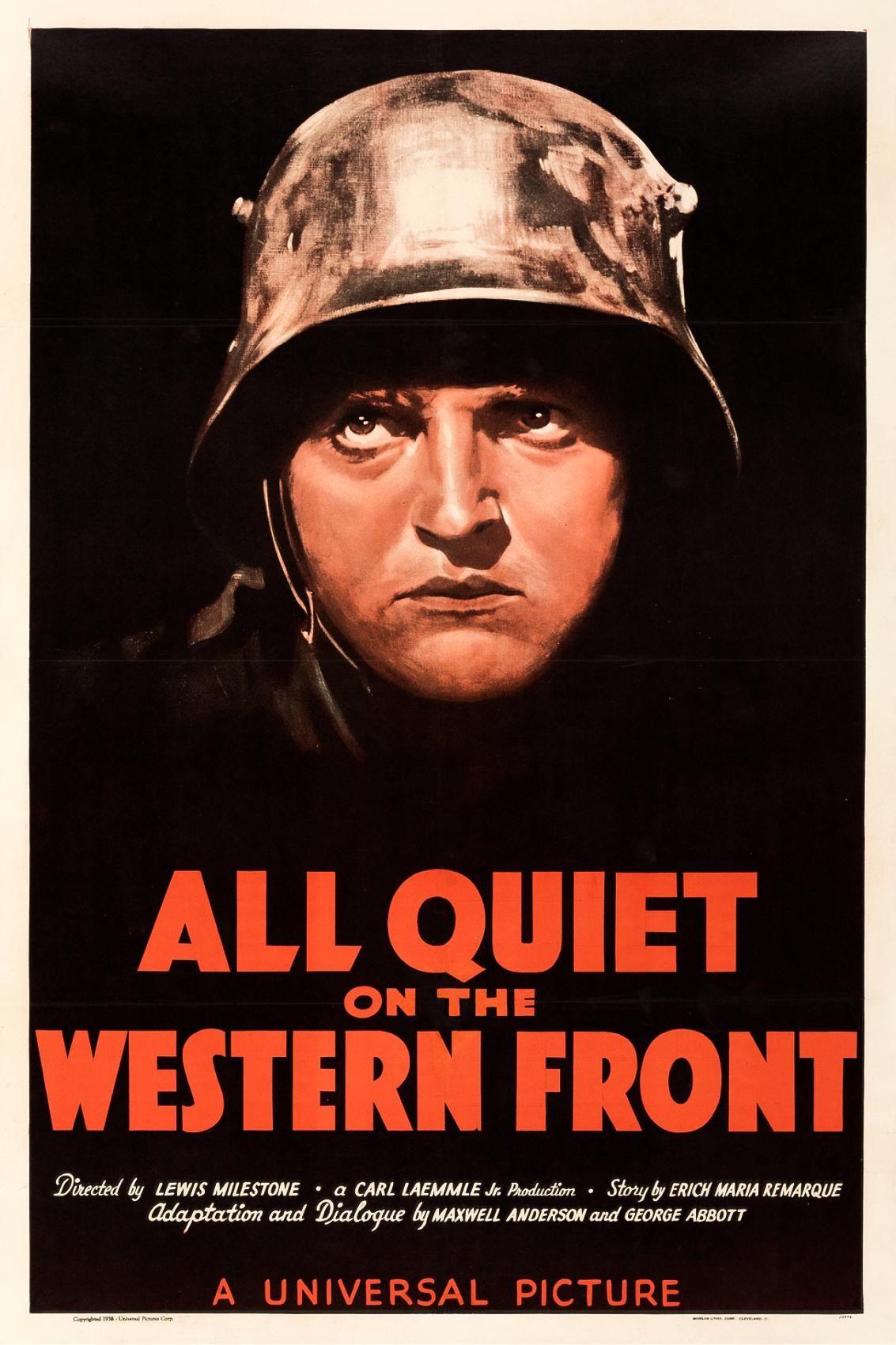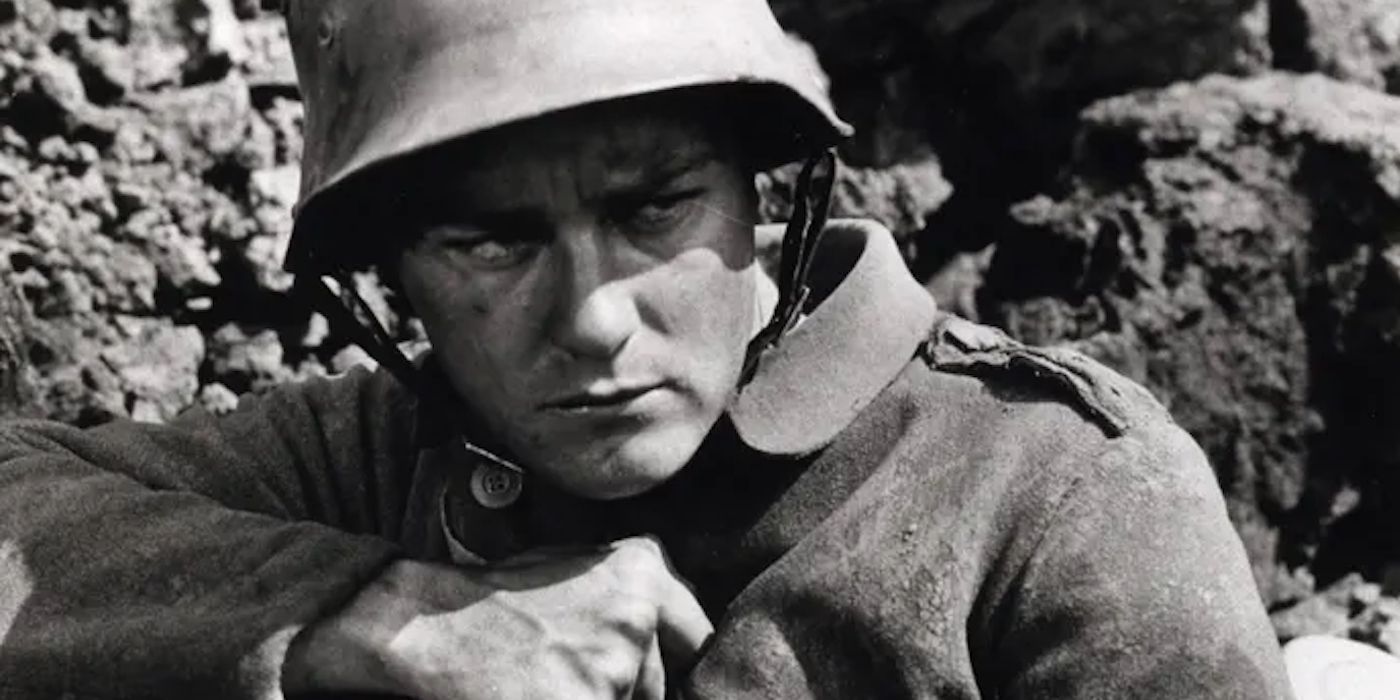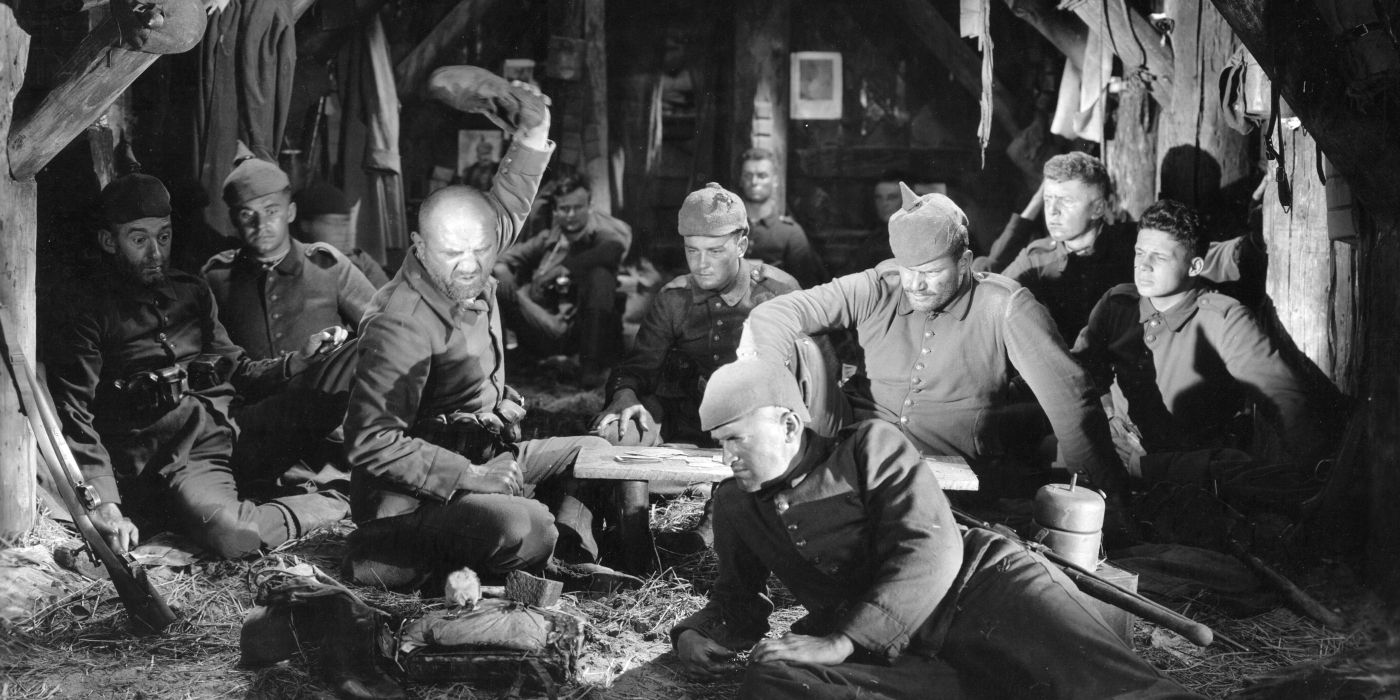The Big Picture
- All Quiet on the Western Front set the standard for realistic war movies, portraying the horrors of armed conflicts and conveying an anti-war message.
- The film was attacked by the Nazis in Germany, who saw it as "Jewish propaganda" and violently disrupted showings to suppress its anti-war sentiment.
- The Nazi Party despised the film and the novel it was based on for challenging the glorification of war and portraying soldiers as victims of senseless conflict.
The winner of the 1930 Academy Award for Best Picture, Lewis Milestone’s All Quiet on the Western Front, set the standards for war movies that were to come. With a compelling story, daunting images, and superb practical effects even by today’s standards, the film became a blueprint for those trying to portray armed conflicts in a realistic fashion, particularly those that wish to convey an anti-war message. Based on the eponymous 1928 novel by German author Erich Maria Remarque, which earned two other film adaptations in 1979 and 2022, Milestone’s picture follows a group of teenage German soldiers that march into World War I unaware of the horrors that await them on the battlefield. As they are forced to kill and die for something that they don’t quite understand, the boys, chief among them Paul Bäumer (Lew Ayres), become disillusioned with notions of glory and of protecting the fatherland.
Like Remarque’s novel, All Quiet on the Western Front the movie was quickly adopted as an anti-war manifesto. And precisely because of that, it just as swiftly made a lot of people unhappy. After all, there are many who profit, either financially or ideologically, from young people killing each other in trenches, and thus there are many that feel more than a little uneasy about anti-war sentiments. In Remarque’s home country of Germany, this group of warmongers was largely represented by a historical group as notable as they are hateful: the Nazi party.

All Quiet on the Western Front (1930)
A German youth eagerly enters World War I, but his enthusiasm wanes as he gets a firsthand view of the horror.
- Release Date
- August 24, 1930
- Director
- Lewis Milestone
- Cast
- Lew Ayres , Louis Wolheim , John Wray , Arnold Lucy , Ben Alexander , Scott Kolk , Owen Davis Jr. , Walter Rogers
- Runtime
- 152 Minutes
- Main Genre
- War
- Writers
- Erich Maria Remarque , Maxwell Anderson , George Abbott , Del Andrews
Showings of ‘All Quiet on the Western Front’ Were Attacked by the Nazi Party
Again, just like Remarque’s novel, Milestone’s All Quiet on the Western Front was not seen with kind eyes by Adolf Hitler and his followers. And while Remarque had to eventually flee from Germany as possession of his book became a nation-wide crime, the movie it inspired was received with violence by the Nazis. At the time still climbing the ladder that would lead them to power, they attacked showings of the film, while also beating patrons and accusing the movie of being “Jewish propaganda.”
Joseph Goebbels himself, the man that would become Hitler’s minister for Propaganda, attended a showing of All Quiet on the Western Front alongside a pack of rabid Brownshirts, the Nazi party’s paramilitary group, at Berlin’s Mozartsaal, recalls the BBC’s History Extra. Ticket booths were destroyed, and audience members were beaten and attacked with stink bombs and sneezing powder. White mice were released into the theater while Goebbels screamed from the balcony heinous things like “Out Jews.” For days on end, Brownshirts stood in front of the cinema, threatening to beat up anyone that dared to buy a ticket for the film or to burn up the place if any showings were to be held again. The tactic worked and Mozartsaal, alongside many other theaters, gave up on screening All Quiet on the Western Front. In his journal, History Extra remarks, Goebbels counted the event as a victory for the Nazis, something that was emphasized by the Weimar Republic banning the film in the name of restoring public order.
The story does not end there. In 1931, a botched version of the film made its way into German theaters. However, two years later, Hitler rose to power, and the movie was banned outright. All Quiet on the Western Front would remain far from German screens up until 1952. Hanns Brodnitz, the Jewish manager of the Berlin theater directly targeted by Goebbels and the Brownshirts, was murdered in a gas chamber in Auschwitz, in 1944.
In a story following the release of Netflix’s German-produced 2022 version of Remarque’s novel, The Hollywood Reporter remarks that the cut of All Quiet on the Western Front that hit Germany in 1930 was already recut in accordance with complaints from a German journalist and the German Counsel General in San Francisco. Still, the changes made were not enough to appease the Nazis. Jewish-German emigrant Carl Laemmle, the man behind the film’s studio, Universal, and the father of its producer, Carl Laemmle Jr., was appalled at the reaction the movie provoked. In a letter published by the German press after the Brownshirts’ attack, he stated that he was amazed that “All Quiet on the Western Front should be threatened with hostility and misunderstanding in a country that has benefited most from it.” This is a reference to the fact that the film was the first to paint the Germans in a sympathetic light in contrast with the heavy anti-German propaganda that ran in the States and its allied countries during World War I.
Why Was ‘All Quiet on the Western Front’ Hated by the Nazis?
“The good sense of the German people will not permit unfair treatment of this film, which has done so much for their best interests,” Laemmle also stated in his letter. He was, of course, wrong. The Weimar Republic simply did not have the strength nor the political capital to stand up against the Nazis. “We Have Forced Them to Their Knees!,” read a Nazi newspaper after the prohibition of the film. But why on Earth were the Nazis so incensed by a movie that depicted German soldiers as humans victimized by the horrors of war?
Well, the first thing to understand is that Nazi hatred for All Quiet on the Western Front did not begin nor did it end with Milestone’s movie. Remarque’s novel was equally despised by Hitler and his minions. Both History Extra and The Hollywood Reporter identify the book, which was a hit both in and outside Germany, as one of the most significant ones burned in the infamous Nazi bonfires. Remarque was forced to flee to Switzerland as the political climate shifted in his homeland, and his younger sister, Elfriede Scholz, was arrested and beheaded in his stead.
Remarque’s novel is a pacifist tale about young men deceived by their elders and lured into a slaughterhouse they can barely make sense of. It is a war story in which the ultimate villain is not the enemy's army, but war itself. Throughout its plot, young boys and men are killed and permanently maimed for absolutely no reason than to make other men richer, and all senses of patriotism, honor, and military valor are thrown out the window.
This sentiment is echoed by Milestone’s film, a project that invested a lot of money in repurposing war memorabilia as props, hiring veterans as consultants, and recreating trenches and battlefields as faithfully as possible to immerse its viewers in the closest thing to a real battlefield one can get on celluloid. Furthermore, the movie also made use of the then new technology of sound to overwhelm audiences with the deafening noises of bombs and machine guns as bodies are thrown to the ground. Add to that the seemingly interminable and silent lulls between battles, as well as the fact that the protagonist dies in the end, and you get a film in which war is boring, ugly, and completely pointless.

1930's 'All Quiet on the Western Front' Invoked Controversy With Its Timeless Message
The classic war story is as haunting today as it was when it originally debuted.‘All Quiet on the Western Front’ Looks at War From a Different Lens
Now, militarism and patriotism are core tenets of fascist ideology. The idea that war is beautiful and a vehicle for glory for young men, and the notion that one must devote their lives to their country are essential to the rise of political movements such as the Nazi party. Thus, it was not with kind eyes that Hitler, Goebbels, and their followers saw the emergence of this anti-war sentiment. “While the theater is packed with ‘Asiatic nomads’ with their wives bedecked with jewelry, this shameful film, stabbing our love for the eternal soldier is being allowed!,” The Hollywood Reporter credits Goebbels with shouting from the balcony during that fateful screening at the Mozartsaal.
But there was also the matter of how the movie portrayed World War I in particular. The Great War, as it was known at the time, ended with Germany feeling humiliated. The country lost a huge chunk of its territory, was forbidden from having an army, and had to pay hefty reparations to the countries it was fighting against. Overall, it felt as if the war had been a completely senseless loss of lives. The Nazis took advantage of the country’s damaged sense of pride, promising to restore it. Part of this effort was making the veterans of the Great War heroic figures instead of victims in the public consciousness. Thus, a movie and a book that painted those that fought on the battlefields of Europe as naive, beguiled boys instead of proud soldiers simply could not stand.
In the end, All Quiet on the Western Front did everything right, and that is precisely why it got a lot of people — most of whom were Nazis — mad. The movie dared to look at a conflict that was still fresh in the world’s memory and point out the horrors that arose from it — horrors that were made even more terrifying by the technological advancements in killing machines that allowed more and more soldiers to drop dead by the second. It also served as a warning to a continent that was unknowingly getting ready to plunge itself into war once more before the decade ended. Unfortunately, there were strong detractors that did not want the movie’s message to be heard.
All Quiet on the Western Front is available to stream on Tubi in the U.S.


